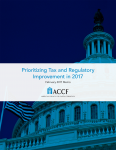 As our national leaders move forward with plans to revitalize the U.S. economy, no two issues have more promise to unleash America’s potential than comprehensive tax reform and improvements to the federal regulatory process.
As our national leaders move forward with plans to revitalize the U.S. economy, no two issues have more promise to unleash America’s potential than comprehensive tax reform and improvements to the federal regulatory process.
On tax reform, our tax code is significantly dated. Taxes, especially on the business side, are too high and unnecessarily complicated. The cumbersome tax system stifles economic growth and restricts our ability to create jobs.
That is why the American Council for Capital Formation has developed a broad set of policy recommendations to streamline the tax code to make it simpler, fairer, and more oriented toward the formation of capital.
President Trump and the leaders of the 115th Congress have both expressed a commitment to making tax reform a reality, using the momentum of the November elections to galvanize bipartisan support for pro-growth tax policies.
The president during his inaugural address restated his support for ensuring that tax policy works to the benefit of American businesses and families. Speaker Paul Ryan and House Ways and Means Committee Chairman Kevin Brady have laid out their own blueprint for reforming the tax code.
President Trump’s call for action mirrors many of the features of the House GOP blueprint. These initial proposals are a strong first step toward the meaningful reform Americans deserve.
Various analyses show that tax reform that moves closer to a consumption tax with full expensing will have a positive impact on economic growth. The Tax Foundation estimates the Ryan-Brady blueprint would create as many as 1.7 million jobs and boost gross domestic product by more than 9 percent.
No matter the details of the final plan, the United States needs tax reform that is simple, pro-growth, and fair. Tax reform also needs to be comprehensive and avoid a patchwork approach. To be truly lasting, tax reform also needs to be transparent and bipartisan.
On the issue regulations, the federal regulatory system is obsolete, cumbersome, and leads to the accumulation of redundant rules that hamper economic growth and investment – therefore improving the way regulations are promulgated is central to reviving the U.S. economy.
Proposals for improving the regulatory process must strike the proper balance between protecting the health and well-being of our communities and facilitating job growth and economic prosperity.
In 2015, ACCF helped establish the Senate Regulations Caucus to support a bipartisan approach to improving the federal regulatory system through an open and transparent legislative process.
There are already a number of legislative proposals out there and President Trump’s Executive Order requiring agencies to repeal two regulations for every one issued is jumpstarting the process of removing many redundant regulations from the books – but changes to the process of creating new regulations itself is still needed.
Moving forward, we must be politically practical and pragmatic, realizing that building a bipartisan consensus on our nation’s regulatory structure will require establishing trust on both sides of the aisle and that the end goal must be to make the process more efficacious.
ACCF supports a bipartisan approach to tax reform and regulatory improvement to get Washington moving again and address important issues plaguing our country’s ability to generate capital, create jobs, and grow the economy.
Dr. Pinar Cebi Wilber & Tim Doyle






